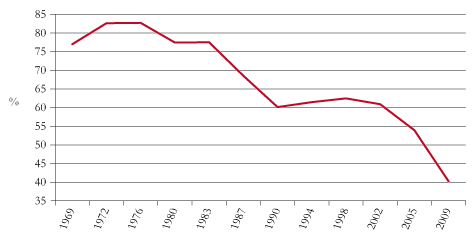Germany’s politics is holding up a comprehensive solution to the eurozone’s sovereign debt crisis, which I discussed in last month’s column. German chancellor Angela Merkel cannot sign up to more funding of the distressed peripheral EMU states because of strong objections and opposition within Germany that threaten to topple her coalition government.
The German political system is fragmenting. Popular support for the main political parties – the ruling Christian Democrats (CDU/CSU) and the opposition Social Democrats (SPD) – has been in structural decline for years. At the same time, Germany’s third party, the Free Democrat Party (FDP), has contracted sharply because those who voted for it have been badly disappointed. Whenever the FDP has had to choose between its party values and staying in power, it has always opted for the latter. So it has remained marginal.
Many former CDU/CSU voters, bitterly disappointed by the CDU under Angela Merkel during its 2005-09 Grand Coalition with the SPD, voted for the FDP in the federal election two years ago. Now disappointed again by the FDP, they’ve migrated to the camp of non-voters.
| Share of eligible vote |
| For the two main parties (CDU and SPD) in federal elections |
 |
| Sources: Electoral Commission, Independent Strategy |
Germany’s fourth party, the Greens, has gradually moved away from its original environmentalist theme to Strukturkonservatismus (structural conservatism). What does that mean? It means nothing must be changed. This is the attitude the CDU/CSU had in the 1960s and 1970s. Now the Green Party has successfully adopted this mantra. It can be seen everywhere (in opposition to the Stuttgart 21 train station and many other ostensibly modernizing projects around Germany). The Green Party is now against almost everything, but unable to provide a constructive alternative. Yet this non-policy is highly attractive to many voters. Younger voters like it because they are often left-wing by inclination and environment-minded. Older voters of the retiring 1968 generation also like the Greens’ approach. Many have been hard-core Green voters for many decades. Now entering retirement age, they do not want change. Instead, they want the government to continue to subsidize their lives, as it has done for 40 years.
The Greens’ strategy is to tap that part of the Rentnergeneration (pensioners) that had formerly never voted for the Greens. The CDU used to be the party for pensioners. But now the retired will become a reservoir of voters for other parties over the next two decades.
There is a catalyst that could change everything: if a charismatic figure in the style of Holland’s Geert Wilders were to emerge. The Thilo Sarrazin affair (in which former Bundesbank council member Sarrazin came out against further EU immigration and integration) has shown that there is a tremendous pool of unhappy voters. The German establishment is afraid that someone might come along and reinvigorate all the issues that the CDU has ignored since they became politically incorrect. If such a person could combine these issues with an anti-euro approach, a new party could jump to 20% of the vote in next to no time.
Germany’s middle class took on the burden of German reunification costs and increased government regulation. And it has been victim to ever-rising social security contributions. As a result, the middle class is angry and happy to vote for alternatives. So the fragmentation of German politics will continue. The more parties that enter German parliament, the more complicated it gets to rule. Small parties can easily blackmail the government with special themes or projects.
Fragmentation means that you cannot take hard decisions and you have to run a permanent open-chequebook solution for all policy issues. That adds to government debt: with so many political parties in parliament, nobody can agree to reduce government expenditure.
The CDU will suffer in the upcoming state elections. The most important is in Baden-Württemberg in March. The CDU has been in charge there since 1953. But if the FDP fails there, the CDU might be forced to form a coalition with the Greens. Merkel has always been opposed to this. In contrast, Norbert Röttgen, the CDU’s environment minister and North Rhine-Westphalia party leader, has been advocating it for years. If it happens, Merkel will be in trouble.
David Roche is president of Independent Strategy Ltd, a London-based research firm. www.instrategy.com